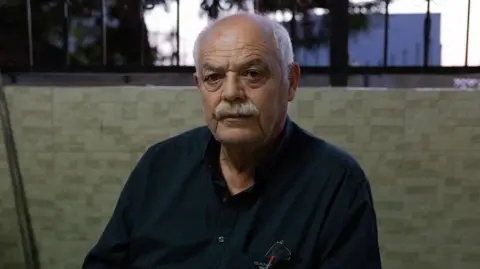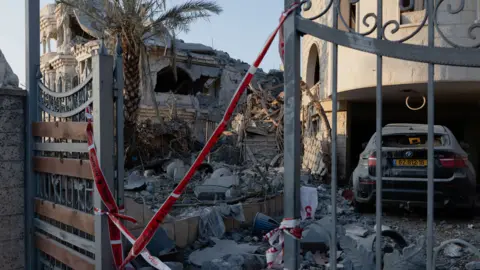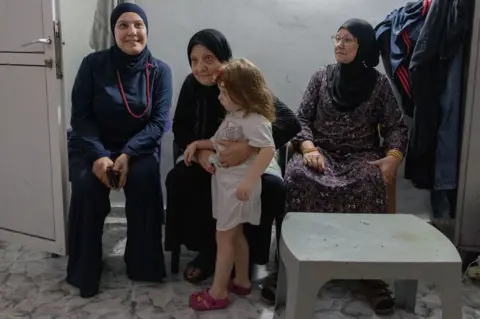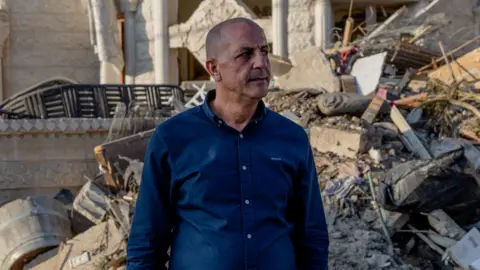Father’s anger exposes divide in Israeli society
BBC Information
 BBC
BBC“I’m so offended,” says Kasem Abu al-Hija, 67.
On Saturday, 4 of his members of the family had been killed when an Iranian missile struck their residence in northern Israel, collapsing the concrete constructing on high of them.
Books, garments, youngsters’s toys and physique elements had been blown into the highway, witnesses say.
The entire avenue was plunged into darkness when the missile hit. Rescuers managed to find their our bodies by following trails of blood.
The 4 victims had been named as Kasem’s daughter Manar Khatib, 45, his two granddaughters, Shada, 20 and Hala, 13, and their aunt, Manal Khatib, 41.
That they had managed to make it to the 2 bolstered secure rooms in the home that they shared – however the ballistic missile hit it instantly.
They lived in Tamra, an Arab-majority city in northern Israel.
Minutes after their deaths, a video emerged on-line. It confirmed the Iranian missiles streaking by the sky overhead. As they descend on Tamra, a voice will be heard shouting, in Hebrew: “On the village, on the village.”
“Could your village burn,” a bunch of others then say, singing, whooping and clapping.

“They sang about what occurred to my household,” says Kasem, softly, surrounded by kinfolk at a vigil.
The video – which reveals Israelis singing a typical anti-Arab chant typically sung by ultranationalist Jews – has been broadly condemned in Israel, with President Isaac Herzog calling it “appalling and disgraceful”.
However there are extra causes that Kasem and the broader group in Tamra are offended about what occurred.
Right here – as is the case with many Arab-majority communities in Israel – there are not any public bomb shelters for its 38,000 residents.
For comparability, the close by Jewish-majority city Karmiel, inhabitants 55,000, has 126 public shelters.
Residents of Tamra have lengthy raised the alarm over the disparity. Located in Israel’s north, about 10km (6 miles) east of town of Haifa and 25km (16 miles) south of the border with Lebanon, the city has been susceptible to rockets fired by the Iran-backed Lebanese group Hezbollah. In October 2024, a rocket fired by the group severely injured one lady.
Throughout Israel, a few quarter of the inhabitants haven’t any entry to a correct shelter. However in non-Jewish native authorities the determine is sort of half, in accordance with a 2018 report by Israel’s State Comptroller, the latest knowledge accessible.
“For a lot of a long time, Arab native authorities have acquired decrease state funding throughout varied areas, together with emergency preparedness,” says Lital Piller of the Israel Democracy Institute, a assume tank.
The place shelters do exist, she says, “they’re few, poorly maintained, and sometimes not fitted to extended stays”.
The BBC has approached Israel’s Ministry of Protection for remark.
Israeli Arabs – a lot of whom want to be referred to as Palestinian residents of Israel – make up a fifth of the nation’s inhabitants. By legislation, they’ve equal rights with Jewish residents, however they routinely complain of state discrimination and being handled as second-class residents.
Following the Gulf Warfare of 1990-91, when Iraqi missiles hit Tel Aviv and Haifa, the Israeli authorities mandated that every one new residential buildings should comprise a bolstered secure room, or Mamad, as they’re recognized.

However Arab communities typically face robust planning restrictions, which ends up in unregulated building and houses being constructed with out them, activists say.
About 40% of Tamra’s houses have their very own secure room, native authorities say, leaving nearly all of residents having to run to neighbours’ houses to share. In lots of instances, because of the quick warning interval, this isn’t attainable.
“The gaps are monumental,” says Ilan Amit, of the Arab-Jewish Middle for Empowerment, Equality, and Cooperation (Ajeec), which works to construct shelters in Arab communities. “I stay in Jerusalem. Each constructing has a bomb shelter. Each neighbourhood has a public bomb shelter.”
As darkish falls in Tamra, residents’ telephones gentle up concurrently with a screeching alert: “You have to keep close to a protected space.”
Sirens quickly observe, and residents – recent from the trauma of Saturday’s strike – panic. Moms collect their youngsters and folks run up the road shouting. A number of households cram into the secure room of 1 home. Some cry, some smile, others twitch nervously. One man closes his eyes and prays. Growth after increase is heard overhead.
The shelter difficulty is much more pronounced in Israel’s Arab bedouin communities – a lot of which stay in villages within the Negev Desert that aren’t recognised by the Israeli authorities, so shouldn’t have shelters constructed for them.
The one sufferer of the April 2024 escalation in hostilities between Israel and Iran was a younger lady from one such group who was severely injured and spent a yr in hospital after fragments from an Iranian missile struck her head.
Lack of shelters can be a prevalent difficulty in a few of Israel’s poorer Jewish communities in areas just like the south of Tel Aviv.

A brand new survey carried out by Hebrew College discovered that 82.7% of Jewish Israelis assist the assault on Iran – however 67.9% of Arab Israelis oppose it. Additional to that, 69.2% of Arab Israelis reported emotions of worry over the strikes – with 25.1% expressing despair.
“Arab society feels uncared for and left behind,” says Amit. “There are enormous gaps in training and employment. There are enormous gaps in shelters, within the existence of shelters.”
Adel Khatib, a municipal official from Tamra, says: “Within the days since this occurred, you’ll be able to really feel the anger.”
“We do not get the fundamental wants,” says Khatib. “A lot of the Arab communities, they do not have group centres or buildings for tradition, actions.”
In line with official Israeli statistics, in 2023, 42.4% of the Arab inhabitants lived beneath the poverty line – greater than double the proportion in Israel’s basic inhabitants.
There have been makes an attempt lately to shut these gaps. In 2021, Israel’s earlier authorities introduced in a five-year improvement plan for Arab society.
“We had been in the course of an enormous leap in social financial improvement, narrowing gaps in training, increased training, and employment,” says Amit.
However Israel’s present right-wing governing coalition, probably the most hardline in its historical past, has slowly lowered funding for that plan – redirecting the cash elsewhere.
A few of these cuts got here as the federal government adjusted budgets to struggle the continued warfare in Gaza, which started in response to the Hamas-led cross-border assault on Israel on 7 October 2023, during which about 1,200 folks had been killed and 251 others had been taken hostage.
“This authorities has been merely placing, you understand, sticks within the wheels of this five-year plan, not making it attainable to implement broad elements of it,” Amit provides.
“For the previous yr and a half, Arab society discovered itself between a rock and a tough place within the sense that on one hand, they’re affected by the insurance policies of the present authorities, and however, they’re seeing their brothers and sisters in Gaza and within the West Financial institution struggling due to the warfare,” he says.
Exterior the ruins of the household residence, Mohamed Osman, 16, a neighbour, says: “Everyone seems to be offended and unhappy.”
Talking of Shada, 20, he says: “She studied her whole life. She needed to be the most effective. Her father is a lawyer, and she or he needed to be like him. All of these goals, simply disappeared.
“They had been the most effective image of a cheerful household…After I think about them, I think about the items of them that I noticed.”
At a vigil forward of the funeral, dozens of group members collect, greeting each other with handshakes, sharing espresso and tea, and mourning quietly.
“The bombs don’t select between Arabs or Jews,” says Kasem. “We should finish this warfare. We should finish it now.”
Images by Tom Bennett


